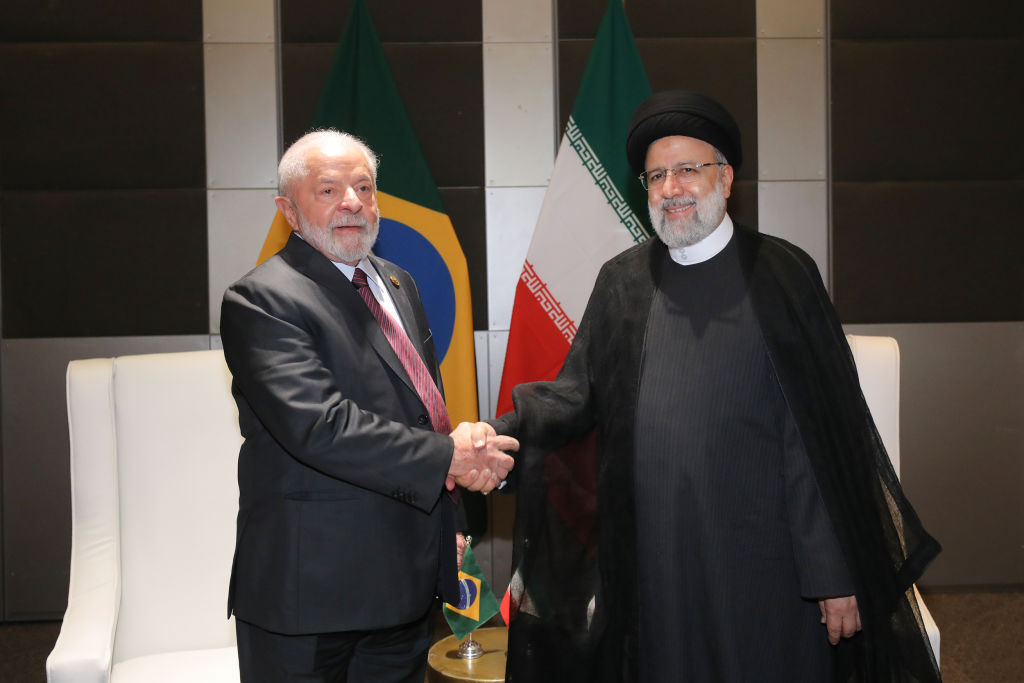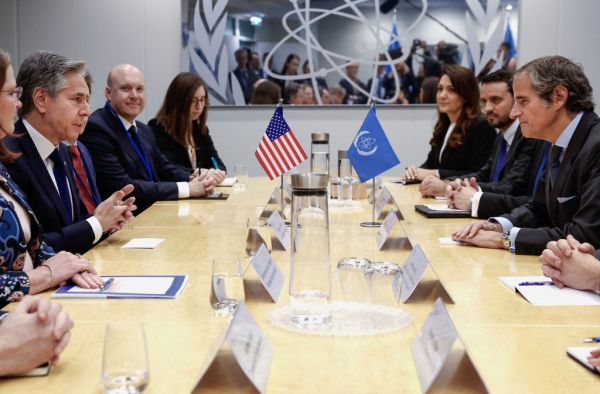Happy Friday! In order to speed up the booking process, according to a senior adviser to the former president, Donald Trump’s height and weight were “pre-reported” on Thursday rather than being measured at Fulton County Jail. He’s listed at 6 feet 3 inches and 215 pounds—exactly the same as Derek Carr, the starting quarterback of the New Orleans Saints.
Quick Hits: Today’s Top Stories
- Former President Donald Trump was booked into Fulton County Jail in Georgia on Thursday for 13 state felony charges related to his efforts to overturn the results of the 2020 election in that state. After spending about 20 minutes in the jail, he was released on a $200,000 bond that had been agreed to earlier in the week. Before flying to Georgia on Thursday, Trump hired Steve Sadow—a high-profile criminal defense attorney from Atlanta critical of the state’s broad RICO law used to charge Trump—to defend him. Mark Meadows, Trump’s former chief of staff and co-defendant in the case, also surrendered to Fulton County authorities after failing to delay the deadline for his booking. He was released on a $100,000 bond.
- The House Judiciary Committee Thursday launched an investigation into Fulton County District Attorney Fani Willis, citing concerns that her August 14 indictment of Trump and 18 co-defendants was “politically motivated.” In a letter to Willis, Chairman Jim Jordan suggested the probe aimed to determine whether reforms—like adding immunities for federal officials, changing the federal officer removal statute, or altering the “delineation of prosecutorial authority between federal and local officials”—were necessary. The Judiciary Committee similarly attempted to investigate Manhattan District Attorney Alvin Bragg in April, following his indictment of Trump.
- The BRICS group—which includes Brazil, Russia, India, China, and South Africa—agreed on Thursday to bring in six new members. Iran and Saudi Arabia—sworn enemies, until recently—plus the United Arab Emirates, Egypt, Ethiopia, and Argentina were invited to join the grouping, which seeks to reshuffle the world order in favor of developing countries.
- Ukrainian officials say the country’s special forces on Thursday conducted an ambitious raid on Russian military installations in occupied Crimea, where they destroyed equipment and raised the Ukrainian flag. The raid, which coincided with Ukraine’s Independence Day, constitutes one of the most daring moves of the summer counteroffensive and is part of a larger effort to target the Crimean peninsula and disrupt Russian logistics there.
- Preliminary Western intelligence reports suggested Yevgeny Prigozhin, the Russian mercenary presumed dead after a plane crash Wednesday, was likely assassinated. U.S. and Western officials said the leading theory was that an explosion—either from a bomb planted on the private jet, or adulterated fuel—downed the plane, rather than missiles, which early eyewitness reports claimed had been fired at the aircraft. Russian President Vladimir Putin acknowledged the crash Thursday, stopping short of confirming the warlord and mutineer’s death.
- The Defense Department announced Thursday it would train Ukrainian pilots on F-16 fighter jets in the U.S., a week after saying it would only do so once the European training effort reached capacity. The U.S. training will now also include maintenance and support personnel for the jets and will begin with English language training in September followed by flight training in October. The warplanes—coming from Denmark, the Netherlands, and Norway—will still take months to reach Ukraine.
- A Moscow court on Thursday extended the pretrial detention of Evan Gershkovich—a U.S. citizen and Wall Street Journal correspondent—for an extra three months, moving his release date from August 30 to at least November 30. This is the second time his detention—which the State Department has officially deemed “wrongful”—has been extended since he was arrested at the end of March.
- Following wildfires that killed more than 110 people earlier this month, Maui County filed a lawsuit Thursday against Hawaiian Electric Company, alleging it acted negligently in failing to cut the power to Maui’s aging electrical infrastructure despite warnings of high winds. The suit says the electrified downed lines set dry brush on fire, kicking off the deadly blaze—though the exact cause of the fires that started August 8 is still being investigated.
- Chinese customs authorities on Thursday blocked all seafood imported from Japan as the country began to release the first batch of treated radioactive waste water from the Fukushima Daiichi nuclear power plant as part of the plant’s decommissioning. Scientists and the International Atomic Energy Agency say the water from the plant—heavily diluted, released slowly, and treated so the level of radioactive tritium is below the minimum standards for clean drinking water—is safe, but China decried the move as “selfish and irresponsible.”
- The Department of Labor reported Thursday that initial jobless claims—a proxy for layoffs—decreased by 10,000 week-over-week to a seasonally-adjusted 230,000 claims last week, suggesting resilience in the labor market despite an historic run of interest-rate hikes.
Brick by BRICS
The BRICS group—a coalition of developing economies that features Brazil, Russia, India, China, and South Africa—may soon be doubling in size. Half a dozen additional countries—Saudi Arabia, Iran, Egypt, Argentina, Ethiopia, and the United Arab Emirates—were invited to join at the end of the group’s four-day summit in Johannesburg this week. Upon first hearing the news, we immediately understood the rationale—how could you pass up a chance to form ICE AIRBUSES?—but then we learned the original moniker is here to stay.
“The name will remain BRICS, it’s beautiful,” Brazil’s President Luiz Inácio Lula da Silva told the summit’s leaders. “The child is already registered. The child has become an adult, she doesn’t want to change her name.” She does, however, want to grow. The coalition hopes to take on a larger profile on the world stage with its boosted membership, but it remains to be seen whether BRICS can become a viable multilateral coalition for developing nations seeking economic partnerships outside of Western-led international groups.
Brazil, Russia, India, and China originally formed the group in 2009—letting South Africa join a year later—as a bloc of emerging economies looking for a dedicated international forum outside of U.S.-dominated coalitions such as the G7 (a club of the world’s seven most advanced economies). Anchored by its annual summit, BRICS provided a platform for emerging market powers, nations in the global South, and U.S. rivals who all felt they deserved more of a say in the international community. “The grouping doesn’t really make that much sense, particularly because it features so many different kinds of countries, different regime types, and also different foreign policies,” Ryan Berg, director of the Americas Program at the Center for International and Strategic Studies, tells TMD. “And yet every country in the BRICS grouping, Brazil included, have found their own justification for continuing to show up at these summits.”
BRICS has long aspired to challenge the global economy’s status quo, particularly the dominance of the U.S. dollar—90 percent of global foreign exchange transactions involve the dollar on at least one end. During the summit, Lula called for member countries to adopt “a reference unit of account for trade” that would facilitate the use of national currencies in transactions. Russian President Vladimir Putin also emphasized the need to move away from the dollar. “The objective, irreversible process of de-dollarization of our economic ties is gaining momentum,” he said in a video-streamed address. (He couldn’t attend in person since South Africa is a member of the International Criminal Court, which currently has a warrant for Putin’s arrest over alleged war crimes.)
But little of the talk has translated into concrete economic plans even though current BRICS members represent more than 3 billion people and nearly one-third of global GDP. “They wanted to strengthen the voice of the developing world and that remains a guiding principle for BRICS, but I find it hard to come up with anything significant that the group has really done,” Bonnie Glaser, managing director of the German Marshall Fund’s Indo-Pacific program, tells TMD. BRICS countries have for years discussed creating their own international currency but have made little progress. The group created the New Development Bank in 2015 to rival the International Monetary Fund and the World Bank. The new bank has approved nearly $33 billion in loans—only a fraction of the more than $115 billion the World Bank lent in 2022 alone. “They don’t seem to stand back and ask what is the actual purpose of the BRICS group,” argued Jim O’Neill—the former Goldman Sachs economist who originally coined the BRIC acronym. “Since [South Africa] joined and the whole political club started, the aggregate growth performance of the BRICS has gone down, and therefore, on its biggest fundamental reason to exist, it’s not doing anything useful.”
And it’s far from clear whether adding new members will change the group’s track record. On the one hand, the new blood increases the total economic and geostrategic heft represented by the bloc. But on the other, six new voices could further fracture a group already filled with divergent interests. “There are huge limitations in how much they can accomplish,” Ian Bremmer, president of Eurasia Group, tells TMD. “They’re countries that are fundamentally not aligned in terms of their political and economic systems. They’re not aligned in terms of their national security orientation. So, even though they have a bunch of things in common, that doesn’t suddenly mean that you’re going to have a strong, functional, multilateral, purpose-led, purpose-driven organization.” India and China in particular are geopolitical rivals despite their shared BRICS membership: Their troops have even clashed in recent years along a disputed border in the Himalayas, resulting in the deaths of 24 soldiers.
Still, leaders at the summit tried to emphasize the shared interests of the bloc. “We all stand for the building of a new multipolar world order, one that is truly balanced,” said Putin. Chinese President Xi Jinping called the expansion “historic.” “It shows the determination of BRICS countries for unity and cooperation for the broader developing world,” he said. But those statements belie the lack of alignment among BRICS members. Celso Amorim, chief adviser to Lula, tacitly admitted as much, saying in an interview, “BRICS isn’t, and never was, about affinities—it’s a group to defend common interests and the common interests of an emerging world.”
The fact that BRICS hadn’t added any new members in almost 15 years betrayed a lack of consensus on the structure of the bloc itself. India and Brazil, for example, had previously expressed reservations about expanding the group. But China and Russia see adding more members as a way to flex geopolitical influence against the U.S. and its allies. “The Chinese want to be able to say BRICS includes x percent of global GDP,” Glaser tells TMD. “They want it to be as big as possible.” The invitation of Iran pushes the BRICS in an anti-American direction, and India—a country that has a relatively warm relationship with the U.S.—will have to navigate that tension moving forward. “The entrance of a country like Iran into the BRICS will make it incredibly difficult for the BRICS to continue arguing that it is not an anti-Western bloc,” Berg tells TMD. India and Brazil had pushed for setting up membership criteria for the group, and the declaration issued at the end of the summit said the group had “reached consensus” on the point, but it did not specify the details or how the newly invited countries met the criteria. Lula said yesterday that new members would be chosen based on their geopolitical clout, not their form of government, offering his support for several additional African nations to join the group—more than 40 countries have expressed interest in becoming members.
The half dozen new members will certainly raise the international profile of BRICS. And even if building consensus on tangible economic policies may be more difficult with more members, the bloc’s symbolic significance and soft power will likely be bolstered by the additions. “What they’re doing is they’re creating cohesion and better relations and more policy alignment among a subset of countries on a specific group of issues,” says Bremmer. “And that is the way that geopolitical power increasingly is evolving in a world that doesn’t really have superpowers anymore.”
Worth Your Time
- For the September issue of the Scientific American, Jessica Wapner investigates the shortcomings of the criminal justice system when it comes to dealing with people with dementia. “Nearly 10 percent of U.S. adults age 65 and over have some form of dementia, and another 22 percent have mild cognitive impairment,” she writes. “Some forms of dementia can trigger behaviors that society classifies as criminal. The radical changes in a person’s behavior and demeanor can erase their sense of social norms. They steal. They grope. They shout abusive language at fellow customers in the grocery store. If the police realize that the suspect they’ve just arrested has Alzheimer’s, they have nowhere to bring that person besides the nearest precinct or emergency room. Jails and prisons aren’t clinically appropriate, because simply being in unfamiliar places and situations can be harmful to people with dementia. Offenders without caregivers may be best served by placement at a long-term care facility, but often they cannot afford it. And the criminal record they now have may make them ineligible anyway. Defendants with psychiatric illnesses may plead not guilty by reason of insanity, or they may insist they didn’t have conscious control over themselves—they were sleepwalking when they stole a candy bar, for example. There are no such protections for elderly people with cognitive disease.”
Presented Without Comment
The Hill: RNC Chair Ronna McDaniel: ‘Surprised’ Candidates Didn’t Talk More About Trump at Republican Debate
Also Presented Without Comment
Politico: Spain Football Chief to Resign After Kissing World Cup Winner on the Lips
Toeing the Company Line
- In the newsletters: Nick argues (🔒) the first GOP debate was a glimpse of what the post-Trump party might look like—and it’s not great.
- On the podcasts: Sarah is joined by Steve, Jonah, and Audrey on the Dispatch Podcast to discuss the GOP debate, the death of Yevgeny Prigozhin, and President Joe Biden’s response to the Maui fires.
- On the site today: Kevin Caroll responds to Gov. Ron DeSantis’ plan to send special forces to Mexico to fight the cartels and Charlotte reports on the plan to send F-16 fighter jets to Ukraine.
Let Us Know
Should decision-making power in global financial institutions such as the IMF and the World Bank reflect countries’ relative economic positions or their relative share of the global population?










Please note that we at The Dispatch hold ourselves, our work, and our commenters to a higher standard than other places on the internet. We welcome comments that foster genuine debate or discussion—including comments critical of us or our work—but responses that include ad hominem attacks on fellow Dispatch members or are intended to stoke fear and anger may be moderated.